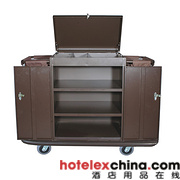
The tiny-home movement has made a large impact on American culture over the last few years. Ranging in size from 120 to 500 square feet, these small dwellings have received significant attention from home and garden programs that aim to promote the homes’ quainter qualities. While suspended sleeping chambers and cozy reading nooks add charm to already precious properties, tiny homes serve other, more socially conscious purposes: They are often eco-friendly and can provide an affordable option in increasingly expensive housing markets.
The social and economic benefits of tiny living are exactly what married couple Deb Delman and Kol Peterson promote through Caravan—The Tiny House Hotel. The Portland, Ore.-based hotel—which, ironically, is located in a city where in living tiny homes on wheels is outlawed on residential properties—provides visitors with a unique chance to experience major downsizing on protected commercial land, and, at the same time, educate themselves on the lesser-known qualities of tiny homes.
The hotel, fitting comfortably into the funky Alberta Arts District, features six individual properties created by different local builders for guests to book: Pacifica, Kangablue, Skyline, The Tandem, Rosebud, and The Caboose. These tiny homes, which are between 120 and 170 square feet, showcase different approaches to tiny living. Pacifica, for instance, is the first known wheelchair-accessible tiny home, Skyline is made almost entirely of salvaged materials, and, naturally, The Caboose is modeled after a train car.
Though tiny homes have only gone “mainstream” recently, Delman and Peterson were there at the beginning of the movement when, in 2011, they conceived the idea and opened the property just two years later. Delman and Peterson have always been interested in small dwellings, living in small structures such as? a yurt (a portable, round tent used as a dwelling by nomads), as well as an accessory dwelling unit (ADU), a secondary housing unit built on a single-family residential lot.
Both Delman and Peterson advocate tiny living through their hotel.?Peterson—who does?ADU consultation work—and Delman host ADU tours around Portland.?Now the site manager of Caravan, Delman also uses her previous work experience with refugees and at-risk youth in her interactions with guests, explaining the importance of affordable accessible housing.
The pair promotes their shared?mission primarily through the community feel their hotel creates. Back in 2013, when?millennials were still deciding on their preferences, Delman and Peterson managed to build what today’s hotelier would identify as a millennial-minded layout; the hotel’s six tiny homes sit side by side surrounding a fire pit. This shared space is used to host advocacy groups from other areas, as well as Portland visitors who would like a tour of the tiny homes. There, Caravan guests can also eat together, socialize, and enjoy special events, like weddings, family gatherings,? and?Caravan Campfire nights that feature?songs and s’mores.
“It is not just about tiny houses—it is also about Portland,” notes Delman. “Whenever we can, we feature local products and local art. We have room service from the restaurant across the street. It is about celebrating our local community,” she says.
Caravan attracts a wide range of guests—wider than Delman admits she ever anticipated. “We expected alternative-minded young people to be drawn to a place like Caravan, but it has attracted a larger demographic than we thought possible—from socioeconomic, to lifestyle, to geography, to age,” she says.
Would-be tiny homeowners are drawn to the movement for the same social and environmental reasons as Delman and Peterson. At Caravan, they are given the chance to experience living in close quarters before taking the plunge.
“Most people come to Caravan because they want to experience what it is like to spend a night in a tiny house. Many people think they actually want to build one, and we try to give them advice during their stay before they spend thousands of dollars and hours building and designing their own home,” explains Delman. Sometimes, Caravan guests who were previously gung-ho on tiny homes decide that, for them, it isn’t the right fit for long-term living. Then again, sometimes, guests who were just looking for fun alternative lodging discover that they could live with a lot less.
“If you read some of our reviews online, you will see that some people have a realization that they don’t need so much stuff or so much space after visiting Caravan,” says Delman. “That is an awesome impact.”









Service Hotline
Work Time:Mon-Fri 9:00-18:00
UTC+8

Sinoexpo Digital Platform
Copyright 2006-2024 Shanghai Sinoexpo Informa Markets International Exhibition Co., Ltd. All rights reserved
沪ICP备05034851号-77
 沪公网安备 31010402000543号
沪公网安备 31010402000543号